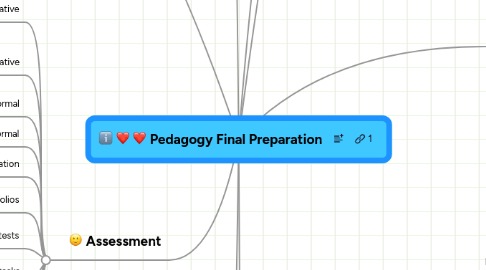
1. General approach to writing objectives, more specific sub-objectives can be added for clarification (understand, appreciate, value, enjoy
2. Teacher Centered Models
2.1. Direct Instruction
2.1.1. a teaching model with the goal of teaching the basic skills and knowledge (factual & procedural)
2.1.1.1. 5 Steps: Establish Set, Demonstrate Knowledge/Skill, Guided Practice, Check for Understanding & Provide Feedback, Extended Practice
2.2. Concept Lessons
2.2.1. A teaching model designed to teach the key concepts that are the foundations to high-level thinking.
2.2.1.1. 4 Steps: Establish Set, Share Examples & Non-Examples, Test for Attainment, Analyze Thought Process & Integration of Learning
2.2.1.1.1. Direct Presentation: Name Concept, Provide Examples & Non-Examples, Test for Understanding
2.2.1.1.2. Concept Attainment - inductive process, label concept after students have considered examples & non-examples
2.3. Presentation Lesson
2.3.1. a teaching model where the emphasis on explaining new information and ideas to students to help them acquire declarative knowledge
2.3.1.1. 4 Steps: Establish Set, Advance Organizer, Present Materials, Monitor & Check for Understanding/Strengthen Thinking
2.3.1.2. Declarative Knowledge (about something) Factual -basic facts & Conceptual - relationship among basic facts
3. Assessment
3.1. Formative
3.1.1. Assessments given before and during instruction to check for prior knowledge and skills.
3.2. Summative
3.2.1. Given at the end of instruction to check for understanding and learning of the material
3.3. Formal
3.3.1. Homework, tests, written reports
3.4. Informal
3.4.1. Observation & Verbal Exchange
3.5. Observation
3.6. Portfolios
3.6.1. A collection of samples of a students work over a period of time
3.7. Teacher-made tests
3.8. Performance tasks
3.8.1. Demonstration of what a student has learned.
3.9. Projects
3.10. Student self-assessment
3.11. Peer assessment
3.11.1. may include evaluating the contribution of individuals to a group task, or reflecting on peer performances.
3.12. Reliable Assessments
3.12.1. Repeatedly produces consistent results
3.13. Valid Assessments
3.13.1. Measures what it claims to measure
4. Differential Treatment of Students
4.1. Self-fulfilling prophecy
4.1.1. a situation in which teachers' expectations and predictions about student behavior or learning cause the behavior to happen
4.2. Teacher expectations
4.2.1. beliefs, attitudes, and perceptions teachers hold about the capabilities of particular students-may or may not be accurate
4.3. Sustaining expectation effect
4.3.1. Occurs when teachers do not change their previous expectations about a student, even after the student's performance has improved or regressed.
5. Problem Based Learning
5.1. Develops inquiry and problem solving skills, adult role behaviors, social skills, and independent learning skills
5.1.1. 5 Steps: Orient to problem, organize for study, assist investigation, develop & present artifacts/exhibits, analyze and evaluate the problem solving process
6. Student Centered Models
6.1. Cooperative Learning
6.2. Discussion
6.2.1. Develop conceptual understanding, increase engagement, develop communication skills & thinking processes
6.2.1.1. 5 Steps: Establish Set, Focus Discussion, Hold Discussion, End Discussion, Debrief Discussion
6.2.2. Emphasizes academic achievement, tolerance and acceptance of diversity and development of social skills through collaborative group projects
6.2.2.1. 6 Steps: Establish Set, Present Information, Organize Learning Teams, Assist Teams, Test on Materials, Provide Recognition
6.2.2.1.1. STAD, Jigsaw, Group Investigation, Structural (think -pair-share, numbered heads together)
7. Theorists and Researchers to Note
7.1. Piaget
7.1.1. Stage of cognitive development: as children grow, they pass through 4 stages of cognitive growth--->>
7.1.1.1. Sensorimotor
7.1.1.1.1. Birth to 2: recognize objects, imitate
7.1.1.2. preoperational
7.1.1.2.1. 2-7 years: language, symbolism, opposite perspective (lack logical operations)
7.1.1.3. Concrete operational
7.1.1.3.1. logical solutions concrete problems, classification
7.1.1.4. formal operational
7.1.1.4.1. logical solutions abstract problems, social issue concerns
7.2. Vygotsky
7.2.1. Zone of Proximal Development: zone between actual development and potential development
7.2.1.1. Level of Actual Development: current intellectual function & ability to learn independently
7.2.1.2. Level of Potential Development: level of function that can be attained with assistance
7.3. Mager
7.3.1. Behavioral Objectives 3 Parts: (STP) Student Behavior, Testing, Performance Criteria
7.4. Gronlund
7.4.1. Alternative approach to behavior objective. Write general objective first, followed by specifics later. (Sub-objectives)
7.4.1.1. A. Example of Gronlund objective from Arends: Student understands and appreciates diversity.
7.4.1.1.1. Example of Gronlund Sub-Objective from Arends: Can define diversity in the words of others and in his or her own words.
7.5. Marzano
7.5.1. Praise - readily available reinforcer, can be effective or ineffective
7.6. Ausubel
7.6.1. Cognitive Structure: organization of information affects how new info is received. Promoted use of "Advance Organizer"
7.6.1.1. Advance Organizer: preview of new information and provide connection to students' prior knowlege
7.7. Gardner
7.7.1. Multiple Intelligences
7.8. Bruner
7.8.1. Scaffolding & Discovery Learning - students create their own ideas and discover own meanings based on experiences.
7.9. Bloom
7.9.1. Blooms (Original) Taxonomy: Cognitive Domain, Affective Domain, Psychomotor Domain
7.9.2. Revised Taxonomy: 2 Dimensions
7.9.2.1. Knowledge Dimension: Factual, Conceptual, Procedural, Metacognitive
7.9.2.2. Cognitive Process: Remember, Understand, Apply, Analyze, Evaluate, Create
8. Organizational Skills for Teachers
8.1. Working with Colleagues
8.1.1. Norms
8.1.1.1. relationships amongst colleagues varies from school to school
8.1.2. Observations
8.1.2.1. important for beginning teachers; either in live classrooms or via the Online Learning Center (Learning to Teach-Ahrends)
8.1.3. Discussing Educational Issues with Colleagues
8.1.3.1. Seek out those who will discuss, both experienced and new teachers
8.1.4. Meetings
8.1.4.1. exchange ideas, planning, and problem solving
8.2. Working with Administrators and Leadership
8.2.1. Changing Norms
8.2.1.1. principal has been buffer between teachers and administration, but now is more actively involved in curriculum and instruction
8.2.2. Gain Principals Support
8.2.2.1. weekly meetings w/ principal for new teachers
8.2.2.2. journal what you are doing in class
8.2.2.3. invite principal to join class
8.2.2.4. write complementary notes when called for
